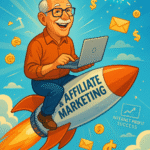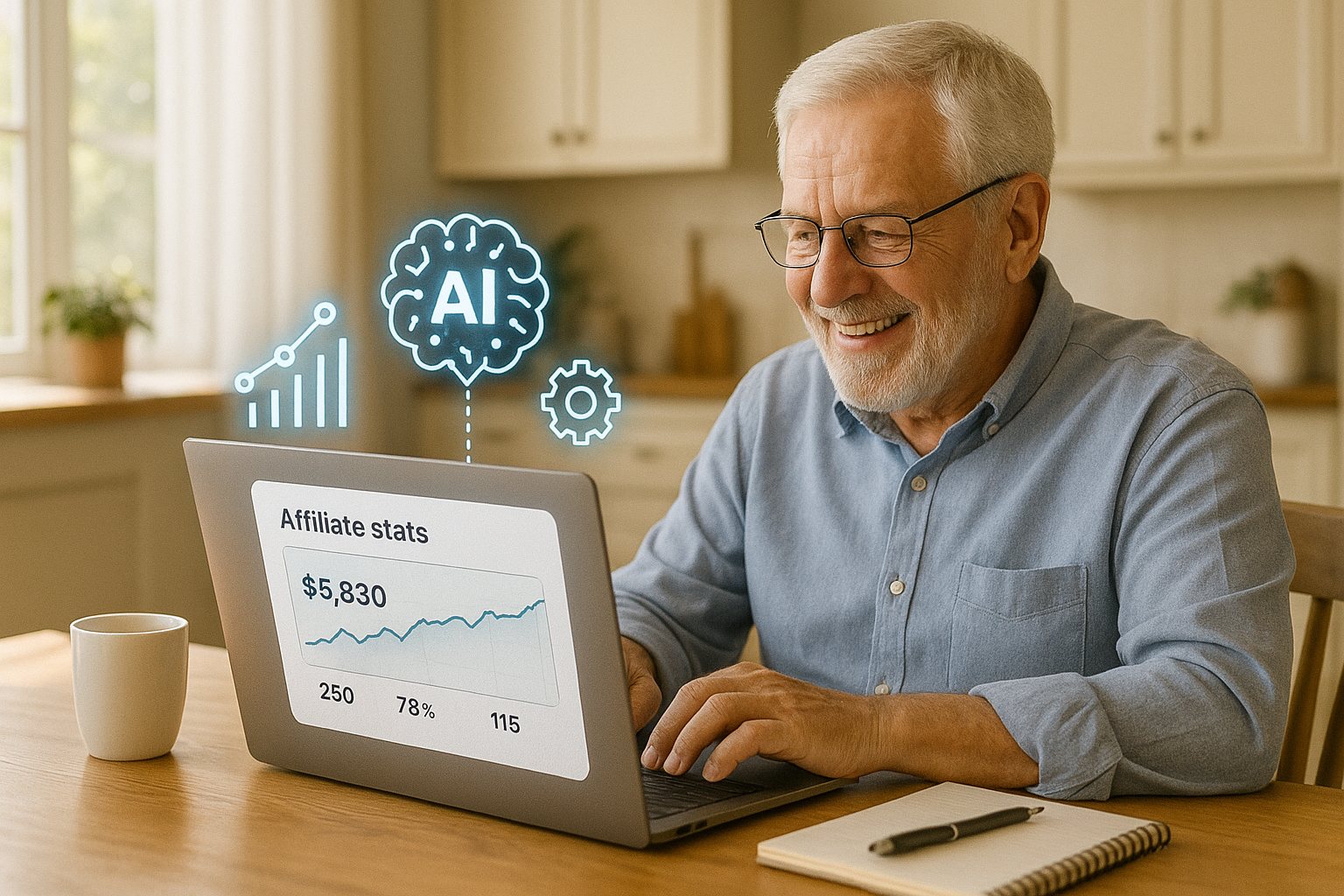How AI and Affiliate Marketing Became My Retirement Lifeline (And Why It Might Be Yours Too)
AI and affiliate marketing

From Coupon Clipping to ChatGPT. A Journey
Back in the day, I was a champion of the Sunday coupon section. Seriously, if they gave Olympic medals for strategic coupon clipping, I’d have a gold or two. My kitchen drawer overflowed with expired deals and “Buy One Get One Free” triumphs. Saving 40 cents on cereal felt like winning the lottery. But even then, I knew deep down… those nickels and dimes weren’t going to carry me through retirement.
Then one afternoon, while trying to fix my ancient remote (which only worked when you whacked it just right), I heard a podcast say something like, "AI is transforming the future of passive income." I nearly spit out my decaf. AI? I barely trusted my microwave.
Still, I looked it up. And wouldn’t you know it, there was this thing called ChatGPT, an AI tool that could talk back, help you write, and even brainstorm ideas. It was like Siri, but smarter and way less snarky. I asked it a few questions about how to make some internet profit success (I even used that exact phrase), and BAM, out came a plan that didn’t sound half bad.
Then I found out you could pair this magical tool with affiliate marketing. Share stuff you already use and like. Add a special link. And if someone else buys it? You get a little thank-you cut. No selling. No begging. No stress.
That’s when it clicked: this wasn’t just some techy toy. This was a way to rewrite the story of retirement. Not with coupons, but with clicks.
The Retired Brain Meets the AI Brain
Let’s be real, I didn’t grow up with computers. I grew up with rotary phones, maps you had to fold, and getting up to change the TV channel. So when I first heard the phrase “artificial intelligence,” I pictured robots doing kung fu or taking over the world, not helping me earn money from my laptop in pajama pants.

I was skeptical. But one thing about retirement is you’ve got time, time to tinker, time to try, time to say, “Well, let’s see what this is about.”
So I opened ChatGPT. Typed in, “How can I use AI to make a little side hustle?” And the response? Not a bunch of tech mumbo jumbo. Just clear steps. It was like having a savvy grandkid who doesn’t roll their eyes when you ask, “What’s a plug-in?”
I started using it to brainstorm blog posts. It suggested products, explained how affiliate marketing works, and even helped me write short blurbs I could post online. It wasn’t scary, but it was helpful. Really helpful.
And the best part? My brain started firing on all cylinders again. Retirement doesn’t come with a manual for staying mentally sharp. But AI gave me a puzzle to solve. A new game to play and a way to feel current without needing to do TikTok dances.
The more I used it, the more confident I became. AI didn’t replace me, it partnered with me. My brain brought the wisdom and real-life know-how. The AI brought speed, clarity, and ideas.
Together? We’re a pretty great team.
Affiliate Marketing. Not What I Thought It Was

If you'd told me a few years ago that I'd be making “internet profit success” by recommending stuff online, I’d have chuckled and asked if you needed a nap. Because like a lot of folks my age, the term affiliate marketing sounded shady. Like someone trying to sell you magic beans or a miracle blender that also repairs your credit.
I thought it was door-to-door sales in digital disguise.
But I was wrong. Way wrong.
Affiliate marketing, it turns out, is one of the most straightforward things you can do online, especially with the help of AI. You don’t need to create your own product, hold inventory, ship packages, or deal with cranky customer emails. Just find stuff you genuinely like or use, share a special link, and if someone clicks and buys? Earn a commission. That’s it.
It’s more like being the friend who says, “Hey, I found this cool flashlight that actually works,” than being a pushy salesperson. No one’s twisting arms. You’re just guiding people to things that make their lives easier.
I started by writing about things I already loved, gardening tools, kitchen gadgets, books I always recommend. AI helped me make the posts better, suggest keywords, and even polish my grammar (because let’s face it, after a few decades, a semicolon is just a fancy comma).
And once the first few people clicked through and made a purchase, I realized, this thing works. Not just for techies. Or just for influencers. But for regular, retired folks like me who still have stories to tell and stuff to share.
How AI Turns Confusion into Internet Profit Success
Let me tell you, the first time I looked into affiliate marketing on my own, it felt like I’d stumbled into a teenager’s science project. There were terms like SEO, backlinks, CTRs, and funnels, and I was just trying to figure out where to click.
Confusing doesn’t even cover it.
Then I brought AI into the mix.
It was like going from trying to cook a fancy recipe with no instructions… to having a chef in your kitchen who patiently explains everything while handing you the ingredients.
AI tools, especially ones like ChatGPT, helped me break down complex marketing tasks into simple to-do lists. I’d ask, “What’s a good product to promote for folks who like gardening?” Boom, it gave me options. I’d ask, “How do I write a blog post about this?” Done, out came a draft better than anything I wrote in high school.
Instead of spending hours trying to figure out what’s trending, what to say, or how to say it… AI just told me. Then I tweaked the content to sound like me (folksy and a little sarcastic), and I was off to the races.
The best part? These tools are free or low-cost. No need to drop hundreds on fancy courses or software. Just show up, ask questions, and follow the suggestions.
What started as overwhelming became manageable. That which felt like rocket science now feels like baking cookies from a box mix, still delicious, way easier.
This, my friend, is how artificial intelligence takes confusion and spins it into something that actually works: internet profit success.
Tech Tips for the Tech-Unsavvy
If you’ve ever yelled at your laptop because it wouldn’t load your email or hit the power button five times thinking it was the volume... welcome to the club. I’ve been there. Heck, I practically built the club.
Tech isn’t always friendly. At least not at first glance. But here’s the good news, AI tools these days are being designed for people who aren’t “digital natives.” You don’t need to be a coder, a web designer, or even someone who remembers their Apple ID password to get started.
The first thing I learned: start small.
Don’t try to build a fancy website on day one. Begin with something simple like a free blog on WordPress or Medium. AI tools like ChatGPT or Jasper can help you write posts, answer your questions, and make you sound smarter than you feel. Seriously, just type “Write a blog post for retired people about gardening tips” and it spits out something you can work with.
Next, look up a free tool called Canva if you want to add images. I was terrified the first time I opened it. Now I use it like digital construction paper.
When it comes to sharing your affiliate links, AI can also help you schedule posts on social media. Tools like Buffer or Hootsuite look intimidating at first, but most have quick video tutorials. Watch one, press a few buttons, and you’re good to go.
And here’s a real tip from someone who’s fumbled every button on the screen: don’t worry about making mistakes. Nothing breaks. You’re not launching a rocket. You’re just learning. Keep clicking.
Because once you push past that tech fear? The confidence boost is real. You start feeling capable again. That’s worth more than any software download
The First “Cha-Ching”. Making My First Sale
There are moments you remember, not because they’re big, but because they mean something.
For me, it was a Tuesday morning. I was feeding the neighbor’s cat, Earl, who glares like I owe him rent, when my phone buzzed. I figured it was another spam call about my car warranty. But no, it was an email that read: “Congratulations! You’ve earned a commission.”

I blinked. I stared. Then I read it again, just in case.
I had made my first affiliate sale.
Someone had clicked on a product link I’d shared in a blog post about ergonomic gardening tools. They bought something. And I earned a little thank-you from the company.
Now, let me set the record straight, it wasn’t a fortune. I wasn’t suddenly booking a cruise or buying a vintage Corvette. But it was real. It was proof that this strange combo, AI and affiliate marketing, wasn’t just smoke and mirrors.
It felt like a virtual high five.
The coolest part? That blog post? I wrote it using ChatGPT. I’d asked it to help me outline the article and punch up the intro. Then I added a few personal gardening tips, dropped in my affiliate links, and hit “publish.” That was it.
No hard sell. No awkward phone calls. Just helpful content that connected with someone else.
And after that first sale? I was hooked.
It’s not just about the money. It’s the feeling that your words matter. That you’re part of the internet in a useful, genuine way.
I still get a little jolt every time a sale comes in. Even now. Especially now.
Rinse, Repeat, Relax
After that first affiliate sale, I did what any rational person would do, I stared at the screen like it might disappear. Then I made tea and danced around the kitchen like a confused dad at a wedding.
But here’s what I didn’t do: start over from scratch.
That’s the beauty of how AI and affiliate marketing work together. Once you find a groove, your niche, your writing style, your process, you don’t need to reinvent the wheel each time. You rinse. You repeat. And eventually… you relax.
Here’s what it looks like for me now:
Every Monday, I open up ChatGPT and ask it something simple like, “Give me five article ideas about low-maintenance plants for retirees.” Boom, it spits out ideas. I pick one, ask for an outline, then start filling it in with my own stories and suggestions.
I toss in an affiliate link or two for gardening gloves or kneeling pads, schedule the post with a free tool like Buffer, and move on with my day.
The next week? Same playbook. Different topic. Maybe it’s air fryers or memory foam shoes or whatever else I’ve recently fallen in love with.
It’s not flashy. But it works.
And the more content I create, the more it adds up. These blog posts and emails become little digital helpers, working in the background, guiding readers, and quietly generating commissions.
So while AI handles the heavy lifting, I get to do the part I love; telling stories, helping people, and occasionally taking a nap.
That’s the dream, right? Set it up. Let it run. Then go enjoy life.
Common Pitfalls and How I Faceplanted
Let’s just say my early days with affiliate marketing and AI were… messy.
I treated my first blog like a lost puppy, nurturing it, checking traffic every 15 minutes, convinced it would blow up overnight. Spoiler alert: it didn’t. Not even close.
In one of my first posts, I forgot to include the actual affiliate link. I’d written this heartfelt piece about my favorite back stretcher (which honestly saved my spine after I tried to lift a watermelon like I was 30 again), and I told readers where to buy it, but forgot to use my special affiliate link.
No link = no commission. Rookie mistake.
Another time, I promoted a product without doing my homework. The reviews online were awful, and a reader called me out in the comments. Ouch. That one stung. I learned quickly: never recommend anything you wouldn’t use yourself.
And then there was the time I tried to set up automated emails with an AI tool. I accidentally sent the same welcome message three times to the same person. They replied, “Thanks, I get it. I’m welcomed.”
But here’s the truth about every single one of those faceplants; they were lessons. Not failures. Every glitch, every misstep, helped me get sharper. Smarter. More prepared.
AI tools have come a long way too, they now remind you about missing links, offer built-in suggestions, and even flag potential issues. It’s like having an error-proof safety net.
So yeah, I’ve tripped a few times. Maybe more than a few. But every stumble brought me closer to building something real. Something that works.
Staying Sharp After 60, AI Keeps the Mind Ticking
When I first retired, I thought I’d be content with the slow lane, morning coffee, walks around the block, maybe a crossword or two. And for a while, that worked. But something started to feel… off. I wasn’t bored exactly, but I wasn’t challenged either. My brain felt like it was just coasting.
That’s when this whole AI and affiliate marketing combo swooped in like mental jumper cables.
Using artificial intelligence to research, write, test, and tweak affiliate content was like discovering a brand-new puzzle box every day. Each blog post idea, product suggestion, or AI-generated headline turned into a fun little mission. It wasn’t about being perfect, it was about being engaged. Curious. Energized.
The more I played with AI tools like ChatGPT, the more I realized it wasn’t just helping me build an online side hustle, it was helping me stay sharp. You don’t have to know everything. You just have to be willing to try things and ask questions.
Suddenly, I was Googling terms like “SEO best practices” and “conversion optimization”, stuff that sounded like gibberish a year ago. But now? It clicks. I follow patterns. I make adjustments. I feel sharper.
Even better, I’ve met others in the same boat, folks who retired and thought they were done learning. Turns out, we’re just getting started.
AI doesn’t just make marketing easier. It makes you feel relevant again. Capable. Like your brain still has some serious horsepower under the hood.
And in a world that loves to count you out after 60, that’s a pretty amazing feeling.
How AI is Changing Affiliate Marketing Forever

Affiliate marketing isn’t new. It’s been around since the early internet days, when dial-up was king and websites looked like digital bulletin boards. Back then, if you wanted to make a buck online, you had to do it all yourself: write the content, research products, design banners, email folks manually. It was a grind.
Now, thanks to artificial intelligence, the game has changed completely.
AI tools are turning what used to be hours of grunt work into a smooth, streamlined process. Need a blog post? Ask AI. Want a product comparison? AI will build it. Not sure which keywords to use? AI’s got you covered. It’s like having a team of experts on call 24/7, and they don’t need coffee breaks.
But it’s not just about speed. AI makes affiliate marketing smarter.
It learns what your audience responds to. It adapts your writing tone. It tracks which links perform best. It even suggests new opportunities you might not have considered. And the most wild part? You don’t need to be a tech whiz to use any of it. If you can ask a question, you can use AI.
This is why it’s becoming such a powerful tool, especially for folks stepping into the online world for the first time during retirement. The playing field’s been levelled. You don’t need experience. You don’t need a fancy degree. You just need the willingness to learn a few things and let AI do the heavy lifting.
Affiliate marketing is no longer a guessing game. AI brings clarity, confidence, and a whole lot more fun to the table.
Here’s What To Do Next
AI and affiliate marketing have redefined my retirement, offering both financial rewards and personal fulfilment. If you're curious about embarking on this journey, there's no better time than now.
To help you get started, I've curated FIVE FREE VIDEOS that walk you through the essentials. These resources are tailored for beginners, breaking down complex concepts into manageable steps.
Dive in, explore, and discover how this dynamic duo can transform your retirement experience.
